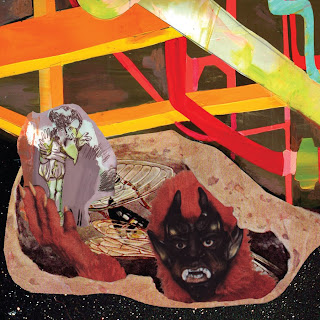
Wolf Parade
At Mount Zoomer
NQL Rating: Those who claim that Apologies to the Queen Mary is a better album cannot be trusted.
A lot of people will try to re-sell the Spencer Krug/Dan Boeckner duality tip, but don't believe it. If Apologies to the Queen Mary saw two songwriters working each as the other's foil, At Mount Zoomer represents a unified front. (Krug and Boeckner even employ the same phrase--"strike up the band"--on "Bang Your Drum" and "The Grey Estates", respectively. Great minds, etc.) Because of this unity, At Mount Zoomer has much more pathos, bolstered by crisper production, stronger melodies, tighter groove, and looser instrumental interplay.
Much has been said regarding Zoomer's roots in studio improvisation, a fact that's evident on "Fine Young Cannibals" and "Kissing the Beehive"--behemoth and leviathan, terrestrial terror and aqueous freakout--with their dime-cut dynamics and minutes-long outros. Also suggesting improv is the album's heavy reliance on rhythm and groove. In service of such, drummer Arlen Thompson is a metronome, providing a subtly rigid backbone while managing to stand out without outshining anyone--he's the secret show-thief, signaling important changes, adding texture, and playing with precision and restraint. The rest of the band aren't slouches, either: Boeckner's guitar rings, squeals, and buzzes; Krug's keys (dig the arpeggios on "Language City") lead the melody more often than not; and Hadji Bakara's electronics work almost subliminally.
Lyrically, the album ranges from obtuse--"I rode horse shapéd fire dragging stereo wire" on Boeckner's appropriately martial "Soldier's Grin"--to direct--"I would've left if you'd just asked me to" on Krug's "California Dreamer". Boeckner, ever the poet, uses words as sculpture, in service of his songs: if on their own the words don't mean anything, damn if they don't sound great in context. On "The Grey Estates" (a kind of modernization of Roxy Music's "In Every Dream Home a Heartache", minus the blowup sex doll spouse), for example, Boeckner implores us to "let the iron in your heart's blood ring"--an empty metaphor, to be sure, but one that works in a song about ditching useless accumulated shit, remembering there's blood in your veins, and returning to Wordsworthian pastoralism. Krug, on the other hand, is the storyteller, the keenly perceptive folklorist, weaving noir ballads ("Call It a Ritual"), tales of love and loss ("California Dreamer"), and spouting truisms ("you will remember me most by my funeral"). When Krug asks, "do the young stay pretty, do the pretty stay quick", one gets the sense that he already knows the answer is "no."
The album receives a few demerits, however, because the keys in "California Dreamer" sound--both in tone and the actual notes played--too much like "Riders on the Storm" (I prefer to think of this as an homage), and the la-dee-das of "Animal in Your Care" are too "The Boxer". But these are nitpicks, and if Spencer Krug has the staying power of Jim Morrison or Paul Simon, fuckin'-a.
Some (okay, most) albums are trifling period pieces inextricable from a specific era. Not so here. In addition to its accessibility, At Mount Zoomer possesses the intangible quality that makes an artifact timeless: the overriding sense that something else is there, something indefinable. Moreover, the cumulative effect of layering hook upon hook upon hook--guitar upon keys upon (what sounds like) steel drum--is titanic, thrilling, and daunting--and ultimately inviting. At Mount Zoomer begs you to dissect it, to parse it into digestible bits only to consume it whole again.
--Brian Herrmann



3 comments:
What is the sexual identity of the reviewer? Yes, it makes a difference.
Blog owner approval? Oh brother!
My sexual identity is genius.
Post a Comment